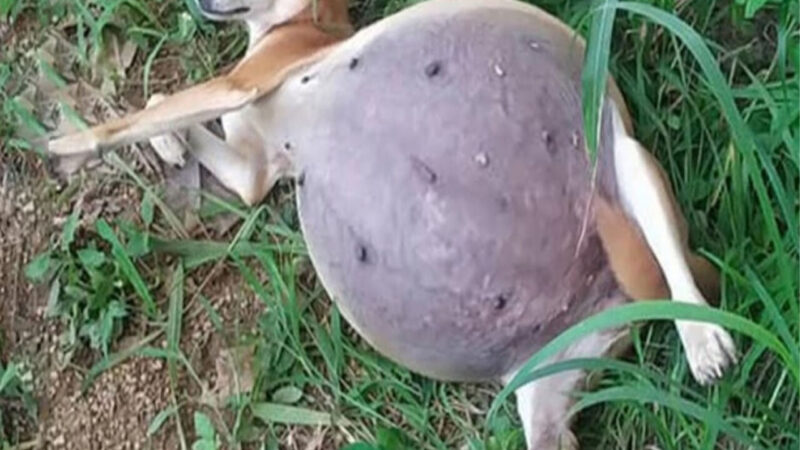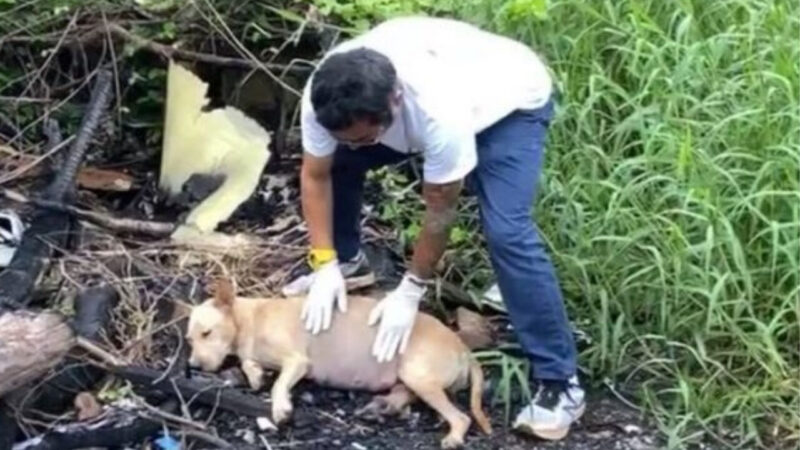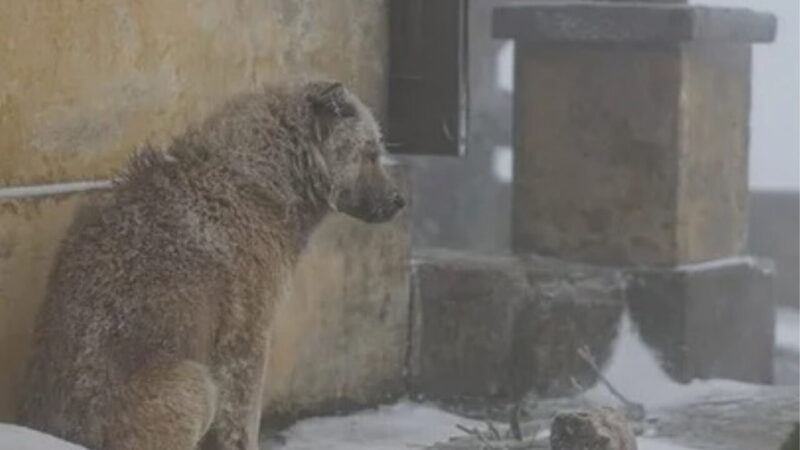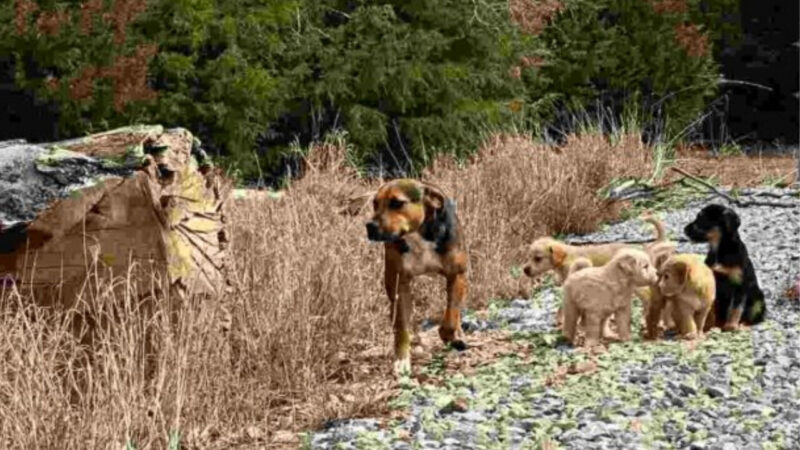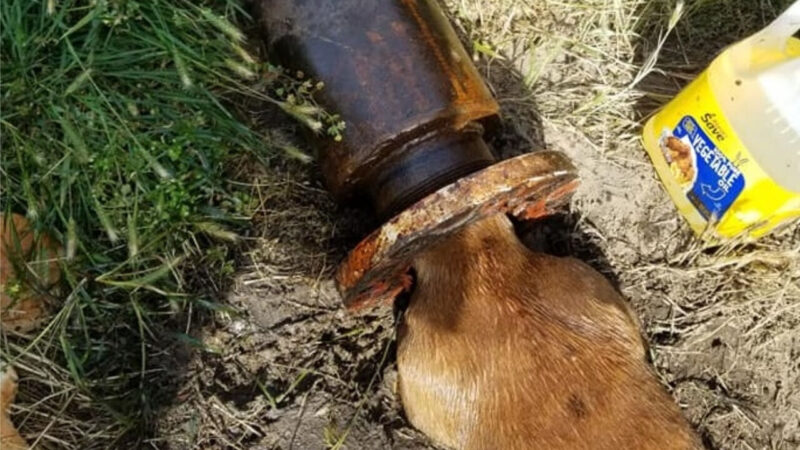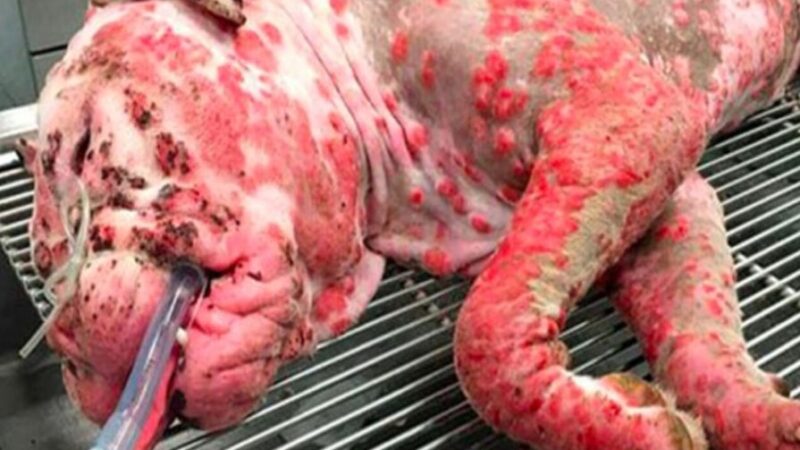I SLEPT UNDER A BRIDGE—BUT MY DOG KEPT ME WARM AND SANE..b
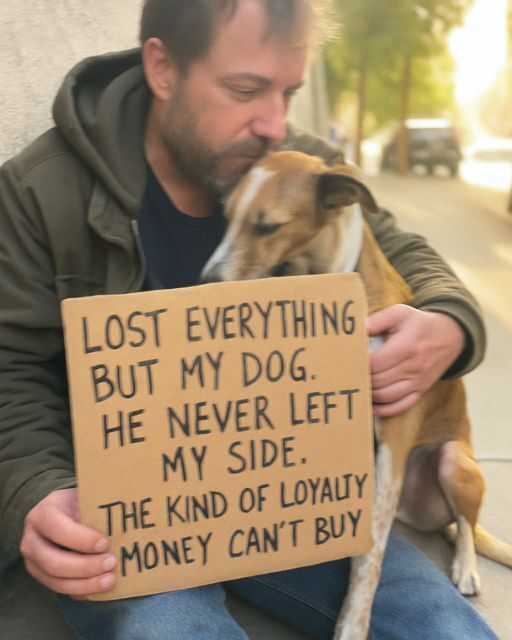
“**I SLEPT UNDER A BRIDGE—BUT MY DOG KEPT ME WARM AND SANE**
People think you hit rock bottom when you lose your house. Or your job. Or your family.
But for me, it was when I realized I hadn’t heard my own name spoken in two weeks. Not once.
Except by him—my dog, Bixby. Well, not in words, obviously. But in the way he looked at me every morning like I still mattered. Like I was still *his* person, no matter what.
We’ve been through it all—eviction, shelters turning us away because of “no pets,” nights curled up in alleys with just a tarp and each other. He never bolted. Never stopped wagging that little crooked tail when I came back with even half a sandwich.
One time, I hadn’t eaten in two days. Someone tossed us a sausage biscuit from a car window. I split it right down the middle, but Bixby wouldn’t touch his half. Just pushed it toward me with his nose. Sat there staring like, “I can wait. You eat.”
That broke me.
I started writing the sign not to beg, but just to explain. Because people don’t always get it. They see the dirt, the beard, the worn-out hoodie. But they don’t see *him*. Or what he’s done for me.
And then last week—just as I was packing up to move spots—this woman in scrubs stopped in front of us. Said five words that didn’t feel real at first.
People think rock bottom is losing your job or your home—but for me, it was going two weeks without hearing my own name. Only my dog, Bixby, reminded me I mattered. We lived through eviction, cold nights, and being turned away from shelters. But he stayed. Always.
One day, someone threw us a sausage biscuit from a car. I split it in half. Bixby pushed his piece back to me with his nose. That broke me.
I never begged. I just held a sign so people could understand. Then last week, a woman in scrubs stopped and said five words: “We’ve been looking for you.” She showed a photo. A social worker had taken it weeks ago. They had a room—dog-friendly.
It didn’t seem real.
But five days later, we had our own warm room. Bixby got a bath. I got clean clothes. A phone call to my sister. Yesterday, Jen offered me a job. I said yes—not just for me, but for Bixby.
Lesson:
Sometimes, it’s not the cold or hunger that breaks you—it’s feeling invisible. But even the smallest kindness can crack that silence. If someone stays by your side when the world turns away—don’t let go.
Today, Bixby is snoring softly on a second-hand dog bed in the corner of the room. It’s nothing fancy—just a thin mattress with a faded paw-print cover—but he’s curled into it like it’s a five-star suite. Every now and then he opens one eye, checks to see I’m still here, then sighs and settles back down. That sound, his sigh, fills up the space in my chest that used to ache with emptiness.
We go on morning walks now. Not to search for warmth or discarded food, but just to walk. We pass a bakery that smells like cinnamon and bread, and Bixby always tugs at the leash when he catches a whiff. Sometimes the baker leaves scraps out. Not because he pities us, but because we’ve become part of the neighborhood.
People nod at me now. Some even say my name. It still startles me when they do.
Jen trained me in slowly. Nothing overwhelming. Just a few shifts helping stock shelves at the community clinic. She didn’t expect me to show up in polished shoes or pretend I had it all together. She only asked for honesty and consistency. I gave her both.
At lunch breaks, Bixby waits on the back porch with a bowl of water and a chew toy someone donated. He knows I come back now. That’s a new rhythm—coming back. For years, we only ever moved forward because we had nothing to return to.
My sister, Anna, cried when I called. Not the kind of crying that demands answers or explanations, but the soft, stunned kind—like she thought I was a ghost. She didn’t even say much at first. Just, “You’re okay? He’s okay?” and when I said yes, we both sat in silence for a bit, letting that be enough. She wants me to visit when I’m ready. No rush, she said. Just come home when it feels like home again.
I don’t tell her how long that might take. Healing isn’t as fast as falling.
But here’s the thing: I’ve started saving. Just a few dollars at a time. Coins, even. I keep them in a small glass jar by the door. I don’t know what they’ll be for yet—a bus ticket, maybe. A better leash for Bixby. A gift for my sister. Maybe one day, even a deposit for our own place, where Bixby doesn’t have to share a hallway with strangers.
The world still scares me sometimes. Loud noises. Unexpected footsteps. The memory of sleeping under bridges or being asked to “move along.” I flinch easier than I used to. But the difference now is—there’s a door that closes behind us at night. A light that turns on. A name I answer to.
And Bixby? He still follows me from room to room. Still tilts his head when I talk. Still curls around my legs when I’m anxious. But now he plays more. Runs a little faster. He’s started carrying his toy bone with him like a trophy. He knows we’re safe, and dogs don’t fake peace the way humans do.
There’s a young volunteer at the clinic—Sam. He’s maybe twenty, kind eyes, too many questions. One afternoon, he asked me, “So what helped you turn things around?” I didn’t know how to answer. I mumbled something about the room, the job, luck. But later that night, I realized the truth.
It wasn’t the room. Or even the job.
It was that moment when Bixby pushed his half of the biscuit toward me. When I had given him everything I could, and he still gave something back. It reminded me that I was worth feeding. Worth loving. That one quiet, defiant gesture from a hungry dog saved me in ways I’ll never be able to explain fully.
People underestimate what love looks like. They think it’s grand gestures or big promises. But sometimes, it’s a cold nose nudging food into your lap. Or someone saying your name after weeks of silence. Or being allowed to shower without worrying someone will steal your shoes.
Love isn’t loud. It’s just steady. Steady like a dog who stays.
I think I’ll always carry a piece of that life with me. The nights spent pretending cardboard was insulation. The meals shared with pigeons and kindness from strangers I’ll never see again. I’m not ashamed of it. It taught me to see things others miss—people on benches, kids who walk with their heads low, animals waiting at alley corners. I notice them now. I look them in the eye. That’s something I learned from being invisible: how powerful it is when someone sees you.
Last night, I walked Bixby past a man holding a sign like I used to. I didn’t have much, just a granola bar and a few quarters in my coat pocket. I handed them over, but more than that—I said, “Hey, I see you.”
He didn’t say anything back. But he smiled. And I knew he understood.
That’s the thing I want to pass on now. Not just money or food—but sight. The act of seeing someone, naming them, reminding them they matter. You never know who’s clinging to hope by a thread you can’t see.
If someone had told me a year ago that I’d be here—clean, housed, employed—I would’ve laughed. Or cried. Or both. But here we are.
And every night, when I tuck into a bed that’s truly mine, with Bixby curled at my feet, I whisper the words I used to only dream of:
“We made it.”

